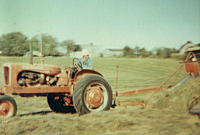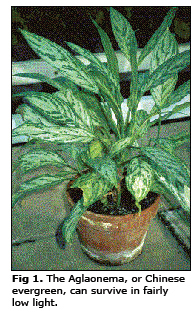 |
|||||
|
What Our Family Has Learned Over the Generations
|
The Master Gardener Tutorial
|
||||
|
Lesson 1: What working with plants does for your soul Growing up as a child on our family farm in Illinois, one of my earliest and most indelible memories was that “all was right with the world.” Life on our farm was always a wondrous experience. Raking hay at noon, waiting for the hot summer sun to dry it enough to start baling, then stacking the hay in the barn. It was so hot in there, that when you climbed down from the hay loft in the barn, and walked out into 100 degree heat days of summer, it felt cool! But when it was complete, there was such a sense of accomplishment. Grandpa infectiously enjoying farming, excited to be doing it, and always with a twinkle in his eye, he would say jokingly, “Two heads are better than one even though one is a cabbage head.” He was always teaching, mostly by his very example, he had a way of giving all of us an understanding and awareness of the energy you received in working with animals or growing plants. When we would be in the fields, we used to wave at every car going down the road simply due to the fact they were our neighbors. I remember the sadness I felt one day when we were working on a fence along the road and grandpa said, “Mike we don’t need to wave so much anymore, there are just too many people now.” I was getting older, and that was probably my first experience with change. Laughter, the art of conversation, a sharp sense of humor, absolute enjoyment in the little things, the smell of freshly plowed clover, the feeling of success when finishing combining a field, the clean look of closure before winter, neighbors popping in and laughing as stories were shared, a reverence for the farm, and a deep respect for God and the Mother Nature you were surrounded by every day. It seems when most people are blessed, they usually are unaware of it at the time, some after the fact, but when you are in tune with growing you are aware you are surrounded and immersed in a very healthy relationship. It is a blessing to inhale the fragrance of plants and the scents of the season. In my case, I learned that doing a good job and exercising your abilities was fulfilling. When I was young, I realized we were born with a sixth sense as Dad or grandpa pointed out how it is that a flock of birds can all cut to the left in unison without a word said, and how working with horses and learning to think a thought to the horse and have it respond to your mental request revealed a kinship with nature. We experienced a mutual respect, when we were able to break into that elevated level of communication. Working with the earth put one in harmony with all things and beings. When we founded our company, I wanted to try to capture that feeling of oneness. I think our company tagline, “Gardening is Good for the Soul,” gets at that sense of peace and gratefulness you feel when you work with the earth and plants. In the last few paragraphs, I had a chance to take you with me through some of my most cherished memories. In sharing them with you, it is my sincere hope to have heightened your awareness that “gardening is good for your soul.” Be it working in your garden or working with potted plants grown in our product we truly hope that we have helped you access that so often needed 30 minute vacation. Our staff and I would like to remind you to make the most of the enjoyment this day has to offer. Remember the simple things and have fun getting back to being a kid and allowing yourself to dive into “perfect play.” – Mike |
Caring for Houseplants David Trinklein and Ray R. Rothenberger
Most potted plants purchased from the florist have been grown in greenhouses under ideal conditions. When they are placed in home environments designed for people, not plants, they need good care to adjust to the new environment.
Houseplants are probably killed or injured more often by improper watering than by any other single factor. No general schedule can be used for watering all houseplants. Size of plant, pot, light, temperature, humidity and other conditions influence the speed with which the soil mass dries out. When to water Lighting Improper light intensity ranks close to improper watering as a frequent cause for failure with houseplants. A plant in proper light is better able to withstand the high temperature and low humidity of many homes. The amount of light necessary for good growth varies with different types of plants. See Figure 1. Flowering plants South, east or west windows are excellent for most flowering potted plants, with the possible exception of African Violets and related plants, which prefer a north window. Plants in bloom should be kept out of direct sunlight since the flowers will heat excessively and collapse more quickly. Light in the average room, away from windows, is not bright enough for most flowering plants, even when ceiling fixtures are kept on. Read more Temperature Proper temperatures for plants are often hard to find in the house. A hot, dry atmosphere shortens the life of flowers. Flowering potted plants should receive temperatures from 65 to 75 degrees Fahrenheit in the day and 55 to 60 degrees Fahrenheit at night. To get the most out of flowering potted plants in the home, move them to a cool spot at night. Foliage plants are more tolerant of high temperatures, but they thrive at temperatures between 65 and 70 degrees. Read more Repotting Plants just brought home from the greenhouse seldom need immediate repotting. Many will not require potting for some time. A newly acquired plant must make adjustments to its new environment, and repotting immediately puts added strain on the plant. When repotting, avoid excessive damage to the root system. Firm the soil gently around the root ball, but do not press so hard that the soil becomes compacted. Allow enough space at the top of the pot so that water can be added easily. Water newly potted plants thoroughly, drain and do not water again until necessary. Read more
|
||||
|
|
|||||

 To many people, a home is not complete without attractive potted plants. Proper care of houseplants helps increase satisfaction and enjoyment from them and extends the blooming period of many flowering plants.
To many people, a home is not complete without attractive potted plants. Proper care of houseplants helps increase satisfaction and enjoyment from them and extends the blooming period of many flowering plants.